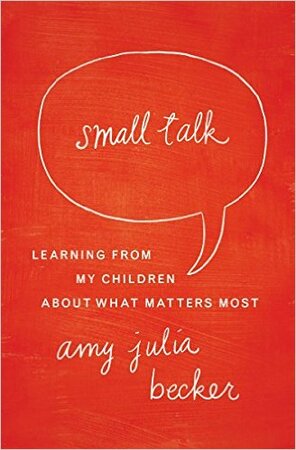As a parent, I've been astounded by how much I'm already learning from my 20-month old daughter. For that reason, when I saw Amy Julia Becker's book, Small Talk: Learning from my children about what matters most, I was intrigued.

Small Talk is a collection of essays about things Amy has learned from her kids about her faith. They can be read a few at a time or devoured all at once. They're profound and yet relatable. At various times throughout this book I found myself in tears – sometimes from laughter and sometimes from the emotions of Amy's words.
As I read Small Talk, I loved reflecting on the birth of my daughter as Amy shared her experience birthing babies and then compared that to spiritual birth. In her words, “Birth is only the beginning of a relationship that asks a lot of the parent and expects nothing but dependency from the child. Maybe dependency is all God asks of us.”
During a moment in history in which it seems like anyone who is the slightest bit different is being “othered”, I also greatly appreciated Amy's essay, Disability. In it, she reflects on her daughter's Down Syndrome, but also on the fact that we are – all of us – broken in some way or another. She then ties this to faith, saying, “Perhaps what is most remarkable about Jesus' posture toward individuals who we might call 'disabled' is that it is the same as his posture toward everyone else. He makes no distinction for people with disabilities. He sees brokenness. He treats every one of them, every one of us, with the dignity every child of God deserves.”
Having spent much of the last three years researching, writing, and speaking about Jesus, I also loved Amy's essay, Jesus, and her take on the particularity of Christ. “I started to wonder whether the particularity of Jesus was an invitation more than an offense, an unfathomable welcome to all the daughters and sons of the earth into the household of God.”
Throughout each essay in Small Talk, Amy's identity as a mom is evident. For this reason, mothers will find this book particularly enjoyable. They'll be able to see themselves in Amy's relationships with her family. I know I did. In fact, I felt like Amy was speaking directly to me when she said, “For a long time, I thought my children were a distraction from the work God was doing in my life and in the world around me. I am starting to realize they are the work God is doing in my life. They are the invitation to give, to receive, to be humbled, to grow. They are the vehicles of grace.”
But make no mistake. Amy's book is not just for mothers. It's also for those – including men – who are looking for a refreshing look at faith and at Scripture. Amy's exposition of Scripture is excellent and will help you shed new light on familiar stories, as it did for me in her exploration of the story of the landowner in Matthew 20. Amy concludes, “The people who were hired last thought of themselves as last. The unemployed. The unworthy. By paying them first, and by paying them with a recognition that they had been trying to work all day long, even if they hadn't actually been working, the landowner offers them a new self-understanding. Instead of seeing themselves as worthless, they can see themselves as valued – just as valued as the winners, the ones who got the job with the contract at the beginning of the day. Those who considered themselves last now perceive themselves as valuable, as first.”
It's this kind of perspective that Amy brings to every essay in Small Talk and that will help you, by the end of it, come to a greater understanding of who you are – as parents, professionals, and people of God.